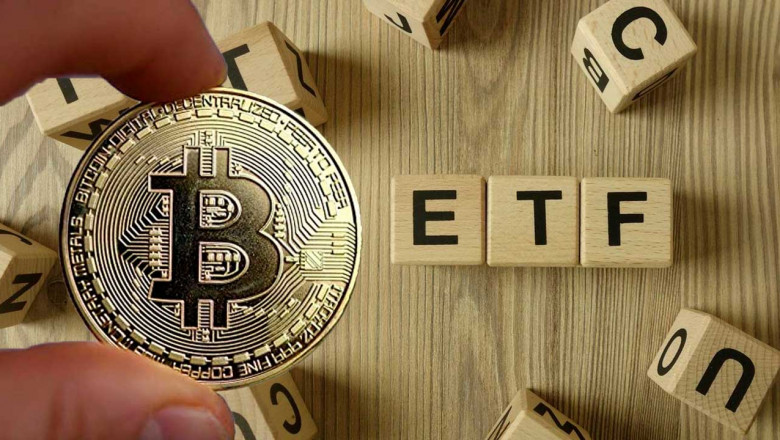Bitcoin ETFs are exchange-traded funds that track the price of Bitcoin through derivatives, cash markets, or Bitcoin ownership. They enable people to allocate their funds to Bitcoin; Without needing to use a digital currency exchange and at the same time providing leverage for its price. Such ETFs are designed to enable more retail investors to allocate their savings to Bitcoin without the hassle of buying the digital currency directly. These mutual funds eliminate the need for excessive funds and security procedures while offering a type of investment that investors are already familiar with. Such ETFs can be traded on stock exchanges.
Introducing Bitcoin ETF

Generally, Bitcoin ETFs are traded on a traditional exchange rather than a digital currency exchange. In theory, Bitcoin is bought by a company, converted into a security, and sold or traded on an exchange. However, the Securities and Exchange Commission continues to reject these proposals. There is no cryptocurrency ETF that directly represents an underlying coin. Currently, the underlying assets in the Bitcoin ETF are linked to Bitcoin futures contracts traded on the Chicago Mercantile Exchange.
The first concept for a Bitcoin ETF emerged shortly after investors and brokers realized that the price of Bitcoin was trending upward and that the digital currency was becoming more popular. Most importantly, there seemed to be an opportunity to make a profit from buying and selling Bitcoin with the Bitcoin ETF. After that, with the increase in the price of Bitcoin above several thousand dollars, small and medium investors lost the opportunity to directly invest in Bitcoin. In response to the demand for investor access to Bitcoin, brokerages began designing exchange-traded funds. Not long after, filings with the Securities and Exchange Commission (SEC) began in 2013 with the Winklevoss brothers.
In an exchange-traded fund that tracks stocks, stocks are purchased by the fund. These are the assets of the fund, and the company that bought them offers the fractional shares on the stock exchange, which is traded almost 24 hours a day, seven days a week. A Bitcoin ETF follows this structure, requiring you to buy and hold Bitcoin. The stock then offers a fraction of its assets on the stock market, which can be traded like a traditional ETF.
How does a Bitcoin ETF work?
Bitcoin ETF means an exchange-traded fund that invests primarily in Bitcoin, the main digital currency. Investing in such ETFs provides leverage to the price of Bitcoin without requiring investors to know how the cryptocurrency works. Additionally, it provides diversification to investors as ETFs can hold multiple assets. In the case of such ETFs, the price of each share fluctuates with the price of Bitcoin. Therefore, if the price of Bitcoin increases, the price of the ETF unit will also increase and vice versa. That said, you should keep in mind that Bitcoin ETFs are traded on stock exchanges such as the New York Stock Exchange (NYSE) and the Toronto Stock Exchange (TSX) rather than on a cryptocurrency exchange.
A Bitcoin ETF is managed by a company that buys and holds real Bitcoin. The price is tied to the bitcoins held in the fund. The company lists the ETF on a traditional stock exchange, and you, as an investor, trade the ETF like any other stock. Bitcoin ETFs also offer new types of trading opportunities; Including short selling where investors can trade on Bitcoin. It is interesting to know that there are some key differences between Bitcoin ETF and other ETFs, which we will discuss below.
The difference between Bitcoin ETF and other ETFs

First, some ETFs, such as those that track the S&P500, represent stocks, so they get a cut of the dividends that each company in the ETF pays to its shareholders. When Tesla pays a dividend and you own shares in an ETF that includes Tesla, you get a (smaller) dividend. Bitcoin is decentralized, so this does not happen with a Bitcoin ETF.
Second, just like other ETFs, you have to pay the company providing the ETF, but with a Bitcoin ETF, part of your fees go toward paying the holding and management fees for buying and storing the Bitcoins that underlie the ETF.
To understand how such ETFs work, you can go through the following points.
ETFs enter into legal agreements with large broker-dealers who act as authorized representatives of the fund. Authorized dealers then buy large blocks of shares directly from the exchange-traded fund and deliver them to retail and institutional investors on the exchange.
Normally, investors buy and sell shares in a certain price range, which is considered as an approximation of the basic value of the fund’s assets. However, supply and demand imbalances can lead to erratic price fluctuations. In other words, if there are more sell orders than buy orders, the brokers try to manage the trades. Additionally, if ETF traders’ holdings become too large, they can redeem shares with that exchange-traded fund. This issue can cause the sale of underlying assets.
Bitcoin ETF Objectives
Bitcoin ETFs in their current form, and the form many investors want, are designed to allow more people to invest in Bitcoin without the expense and hassle of buying it. They eliminate the need for security procedures and excessive funds while offering a familiar type of investment.
security
While you don’t technically have cryptocurrency in your wallet, you do have security keys that you need to protect. If you buy your cryptocurrency through an exchange, you can choose to have your keys stored at that exchange if it also offers the service. However, wallets and exchanges can be hacked and keys stolen. This means that your digital currency can be stolen and its security is low. You can store your keys offline using several methods, but none of these methods are completely secure or guaranteed. An ETF does not require you to hold any digital currency, store keys securely, or move keys back and forth between different types of storage. In fact, you are the shareholder of the fund, which brings the risks of key storage to you.
High prices
One of the most important obstacles for average investors is the price. Bitcoin (BTC) hit a record close to $69,000 per BTC shortly after the Bitcoin ETF listed on the NYSE. Over the new months, its price began to drop, reaching nearly $35,000. So even at low prices, retail investors may not have the assets to buy 1 Bitcoin. An ETF allows you to gain exposure to BTC according to your budget, risk tolerance and investment goals.
There is a better understanding of ETFs
Perhaps most importantly, ETFs are much better known throughout the investment world than cryptocurrencies. Even more complicated as digital coins and tokens grow in popularity. So if you’re just interested in participating in cryptocurrency investing, an ETF allows you to focus on asset trading instead of learning about blockchain, mining, decentralized exchanges, distributed ledgers, key storage, and cryptocurrency. Focus on what you already understand.
Advantages of Bitcoin ETFs
It provides comfort
Allocating funds to such ETFs provides leverage to the price of digital currency without investors needing to know how the digital asset is performing. In addition, by choosing this investment option, one does not have to accept the risks related to direct ownership of coins and registration in any digital currency exchange.
Efficient taxation
Since the cryptocurrency market is decentralized and unregulated, you don’t get any tax benefits by buying Bitcoin directly. The SEC, or Securities and Exchange Commission, is said to regulate some futures Bitcoin ETFs. As a result, such ETFs can offer tax efficiency.
It offers variety
These Bitcoin ETFs have a portfolio of multiple assets. For example, an ETF might hold shares of Apple and Netflix in addition to Bitcoin. This high level of diversity reduces the amount of risk. Hence, people looking to diversify their portfolio may consider allocating their money to such mutual funds.
Disadvantages of Bitcoin ETFs
No actual ownership of Bitcoin
Since central banks do not regulate Bitcoin, the digital currency acts as a hedge against stocks and fiat money. It offers investors a way to minimize the risks associated with the financial system. Additionally, the digital asset protects users and investors by providing privacy through the Bitcoin blockchain. The government is said to be regulating bitcoin exchange-traded funds, removing the benefits that the digital currency offers.
Costs
Typically, ETFs, including Bitcoin ETFs, impose fees on investors to pay the people who manage the fund. People should check the Bitcoin ETF’s expense ratio to know what percentage of their holdings they need to pay into the fund to cover management fees. It should be noted that the lower the expense ratio, the better for investors.
Restrictions on digital currency trading
People can trade Bitcoin with other cryptocurrencies such as XRP, Ethereum, Polygon and Litecoin. That said, a Bitcoin ETF cannot be traded against other cryptocurrencies; Because it is an investment fund that tracks the price of Bitcoin, not a digital coin or a token.
ETF inaccuracies
While ETFs track the price of Bitcoin, there are many different assets to diversify a portfolio. This indicates that the price of the Bitcoin ETF may not reflect a 50% increase in the price of Bitcoin due to the presence and impact of other assets. Therefore, although the ETF provides leverage for the price of Bitcoin, it may not be able to accurately track the price of the cryptocurrency.
Is it recommended to buy Bitcoin ETF?
A Bitcoin ETF is an exchange-traded fund that tracks the price of Bitcoin through cash markets, derivatives, or Bitcoin ownership. It can be said that this is a very risky investment. Therefore, it is better to consult a professional advisor or an analyst before buying and investing.
What is the best Bitcoin ETF?
While there are several Bitcoin ETFs on the market, they are all based on the price of Bitcoin futures contracts. It is better to research and consult with an expert before buying a Bitcoin ETF.
Can you buy a Bitcoin ETF?
Several Bitcoin ETFs are available for investors to trade. ProShares Bitcoin Strategy ETF, Valkyrie Bitcoin Strategy and Van Eck Bitcoin Strategy ETF are some examples of these.
The impact of ETF futures on the price of Bitcoin
Since the emergence of the Bitcoin Futures ETF, this tool has also become one of the factors affecting the price of digital currency, especially Bitcoin. If most of the ETFs offered have a price higher than the current price, it is possible that the market for this digital currency will increase. This actually means an increase in positive sentiment towards the world’s leading digital currency. On the other hand, the closeness of the price agreed in the contracts to the current price means that the market expects the value of BTC to stabilize or decrease in the future.
In addition, the increase in demand for ETF futures in traditional markets and the agreed prices on them leads to an increase in the price of Bitcoin in the digital currency market. On the other hand, providing this tool reduces the impact of digital currency whales on the price of this coin as much as possible. In this way, the possibility of deliberate market fluctuations is reduced.
Another benefit of increasing the trading volume of Bitcoin futures ETF in the long term is its positive effect on the liquidity of this coin. Finally, the stability of the market, as well as the increase in the price of Bitcoin and its greater acceptance, will have a positive effect on the prosperity of the entire digital currency market, and will cause the emergence of tradable funds for other digital currencies.
The most important Bitcoin futures ETFs

Some of the largest Bitcoin Futures ETFs in the US are:
ProShares Bitcoin Strategy or BITO owned by ProShares Investment Company.
ProShares Short Bitcoin or BITI; Owned by ProSahres Investment Company.
Bitcoin Valkyrie Strategy or BTF; Owned by Valkyrie Digital Asset Investment Company.
VanEck Bitcoin Strategy or XBTF; Owned by VanEck Investments.
Simplify Bitcoin Strategy PLUS Inc or MAXI is a property of Simple Investment Company.
Global Strategy X Blockchain and Bitcoin or BITS; Owned by Global X ETFs.
It is the largest Chicago Mercantile Exchange in terms of assets under management (AUM). The assets under management of this fund reached 904 million dollars in December 2023, which is a significant difference compared to its competitors. Other major markets for buying and selling Bitcoin futures ETFs include the New York Stock Exchange (NASDAQ) and the New York Stock Exchange (ARCA).
Bitcoin futures ETF path forward
Bitcoin futures ETF trading has acted as a bridge between traditional and modern markets in recent years. They paved the way for digital currencies to enter traditional markets with lower technical risks and led to greater investment portfolio diversification. However, it seems that the next important step for the greater acceptance of this financial instrument is the permission of the Spot Bitcoin ETF to be listed on the US exchange by the SEC. An event that will most likely lead to an increase in the price of this coin as well as an increase in the demand for its derivatives.










I enjoy what you guys tend to be up too. This kind of clever work and
reporting! Keep up the superb works guys I’ve included
you guys to our blogroll.
Hi, I do believe this is an excellent blog. I stumbledupon it 😉 I am going to come back once again since I book-marked it.
Money and freedom is the greatest way to change, may you be rich and continue to
guide others.